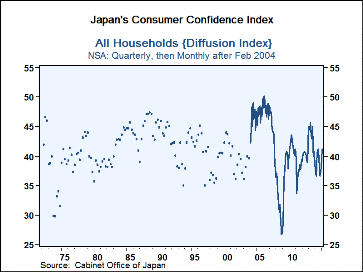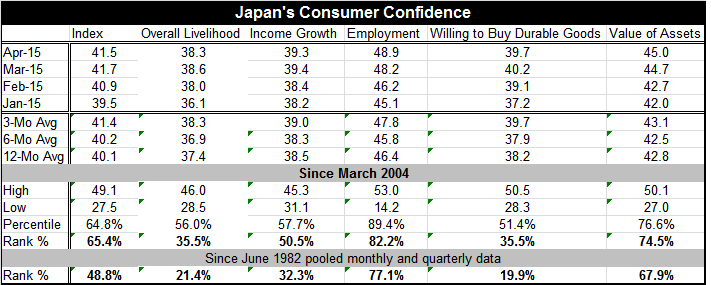 Global| May 15 2015
Global| May 15 2015The Thrill Is Gone: Japan's Consumer Confidence Continues to Sag
Summary
Consumer confidence in Japan, a diffusion index, fell to 41.5 in April from 41.7 in March. The fall itself is not very telling, but it confirms that Japan is really stuck in the doldrums. The confidence index sits in the 48.8 [...]
 Consumer confidence in Japan, a diffusion index, fell to 41.5 in April from 41.7 in March. The fall itself is not very telling, but it confirms that Japan is really stuck in the doldrums. The confidence index sits in the 48.8 percentile of its historic queue over its broadest period of availability. Over the shorter horizon from 2004, when the index began to be available monthly, it sits at a higher but still modest position, at its 65th percentile. Any way you slice it, consumer confidence in Japan is lagging. Relative to its longer horizon, the index stands below its midpoint. Relative to its 2004 starting point, its standing is simply modest. We will refer to the standing since 2004 in our discussion below.
Consumer confidence in Japan, a diffusion index, fell to 41.5 in April from 41.7 in March. The fall itself is not very telling, but it confirms that Japan is really stuck in the doldrums. The confidence index sits in the 48.8 percentile of its historic queue over its broadest period of availability. Over the shorter horizon from 2004, when the index began to be available monthly, it sits at a higher but still modest position, at its 65th percentile. Any way you slice it, consumer confidence in Japan is lagging. Relative to its longer horizon, the index stands below its midpoint. Relative to its 2004 starting point, its standing is simply modest. We will refer to the standing since 2004 in our discussion below.
The April assessment of overall livelihood slipped slightly, leaving the index standing below a level of 50 (the neutral position) in the 35th percentile of its queue, a very weak standing. Income growth also ticked lower but stands at a higher 50.5% percentile of its queue. The willingness to buy durable goods index fell by one-half of one point to stand in the 35th percentile of tis queue. Meanwhile, the value of household assets moved higher to stand in the 74th percentile of its queue of data since 2004. Also improving was the assessment of employment conditions, the component with the highest queue standing and raw diffusion score of all. However, its raw score is still below 50. Thus, the rise in the employment reading means that conditions are still worsening but are doing so more slowly. Such is the nature of any `improvement' in this report.
From these data, we see that the raw diffusion assessments for April are below 50. That tells us that conditions are still on balance below neutral for each of these surveyed concepts. The value of assets and employment indices are two of the stronger readings; both are closing in on a raw diffusion score of 50 which is the neutral reading. Given jobs and better asset values, consumers should begin to feel better. Even though these two metrics did improve in April, assessments of livelihood and willingness to buy eroded. But then income growth also notched lower.
Japan is still struggling to improve. Consumer confidence is slipping and its components all are below neutral. Only two of five metrics showed any movement toward improvement in April. While the Bank of Japan is happy that inflation expectations are improving, a key gauge of theirs for how their policies are working, the actual impact on the economy and consumer perceptions appears to not be muted. After an initial flurry of improvement in the wake of Japan's QE announcement and the adoption of Abenomics, to the consumers, the thrill is now gone.

Robert Brusca
AuthorMore in Author Profile »Robert A. Brusca is Chief Economist of Fact and Opinion Economics, a consulting firm he founded in Manhattan. He has been an economist on Wall Street for over 25 years. He has visited central banking and large institutional clients in over 30 countries in his career as an economist. Mr. Brusca was a Divisional Research Chief at the Federal Reserve Bank of NY (Chief of the International Financial markets Division), a Fed Watcher at Irving Trust and Chief Economist at Nikko Securities International. He is widely quoted and appears in various media. Mr. Brusca holds an MA and Ph.D. in economics from Michigan State University and a BA in Economics from the University of Michigan. His research pursues his strong interests in non aligned policy economics as well as international economics. FAO Economics’ research targets investors to assist them in making better investment decisions in stocks, bonds and in a variety of international assets. The company does not manage money and has no conflicts in giving economic advice.
More Economy in Brief
 Global| Feb 05 2026
Global| Feb 05 2026Charts of the Week: Balanced Policy, Resilient Data and AI Narratives
by:Andrew Cates






